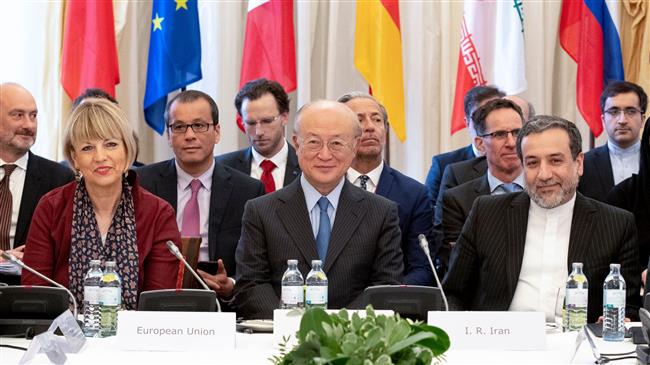Delegations from Iran and five leading powers meet in Vienna on Friday, trying to save the July 2015 nuclear deal after the Trump Administration’s withdrawal.
Iranian Foreign Minister Mohammad Javad Zarif will meet counterparts from the UK, China, France, Germany, and Russia for the first time since Donald Trump’s May 8 announcement expanding US sanctions.
The Rouhani Government has tried to counter Washington by assuring the cooperation of the European Union and its members, not only for political support but also for essential trade and investment links. However, the effort has been blunted by the EU’s inability so far to protect big companies against US punishment.
The Trump Administration has said it will sanction any foreign company with a US connection which continues to trade with the Islamic Republic after November 4. Major firms such as France’s energy giant Total, the French manufacturer of Peugeot and Renault vehicles, Germany’s Siemens, and the world’s leading shipping firm Maersk have suspended business with Tehran already.
In recent days, President Hassan Rouhani — under pressure from hardliners in Iran, to the point where his stay in office has been threatened — has pointed to possible failure. His visit this week to Europe was to non-EU Switzerland and to Austria, which has far less influence than the nuclear deal’s participants UK, France, and Germany.
Rouhani told French President Emmanuel Macron on Thursday that a EU set of proposals “does not meet all our demands”. Speaking with Germany Chancellor Angela Merkel, he called the economic measures “disappointing”:
Unfortunately, the proposed package lacked an action plan or a clear roadmap for continuation of cooperation. It only included some general promises like previous EU statements.
French Foreign Minister Jean-Yves Le Drian offered little immediate hope for Rouhani, saying that it is unlikely European powers will be able to put together an economic package that will satisfy Iran before November.
Le Drian said the priority was to establish a financial mechanism to get around the Trump Administration’s threats: “We are trying to do it before sanctions are imposed at the start of August and then another set of sanctions in November. For the start August it seems a bit short, but we are trying to do it by November.”
This week the European Parliament gave the European Investment Bank authority to invest in Iran from August. However, the EIB’s policy is not to lend to Iran and other countries listed as high by the Financial Action Task Force, which tries to block financing of global terrorism.
The bank also may have difficulty raising money in US financial markets if it supports projects in Iran.
Le Drian called on Tehran not to break commitments to the agreement: “They must stop the threats so that we can find the solutions so that Iran can have the necessary economic compensations.”
In recent days, Rouhani, his officials, and the Iranian military have issued defiant statements that they will respond to the US effort to choke off Iran’s oil exports. This has raised concerns that Tehran will return to previous threats to close the Strait of Hormuz, at the top of the Persian Gulf, to oil tankers.
See Iran Daily: Rouhani and Military — We Can Retaliate Against US Sanctions

